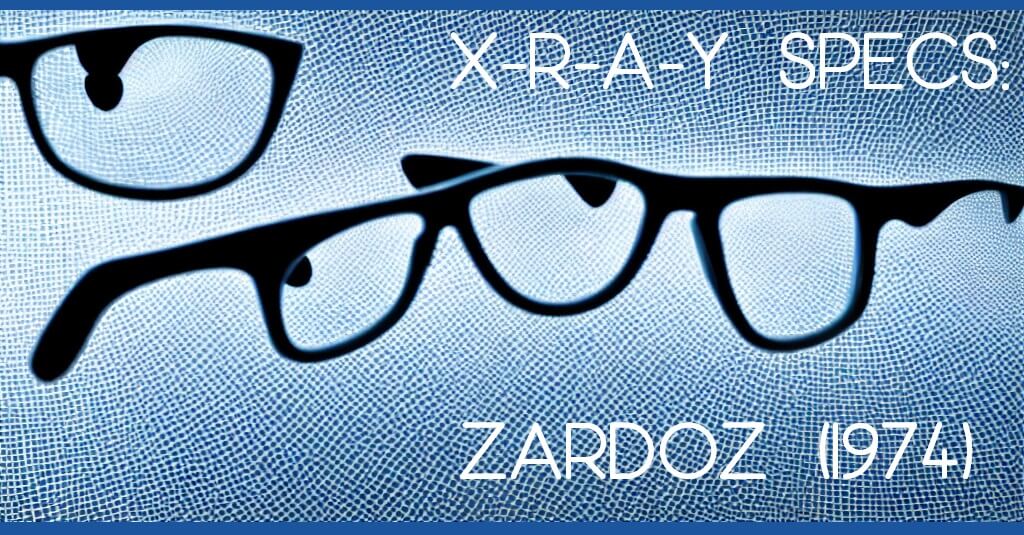Welcome to X-R-A-Y Specs, a film roundtable in which four of our radiological technicians converse about movies. This edition’s selection is Zardoz, John Boorman’s 1974 outing—the next film he made after the commercial and critical success of Deliverance—which is probably best known for being the movie where Sean Connery wears a red diaper and a long braid.
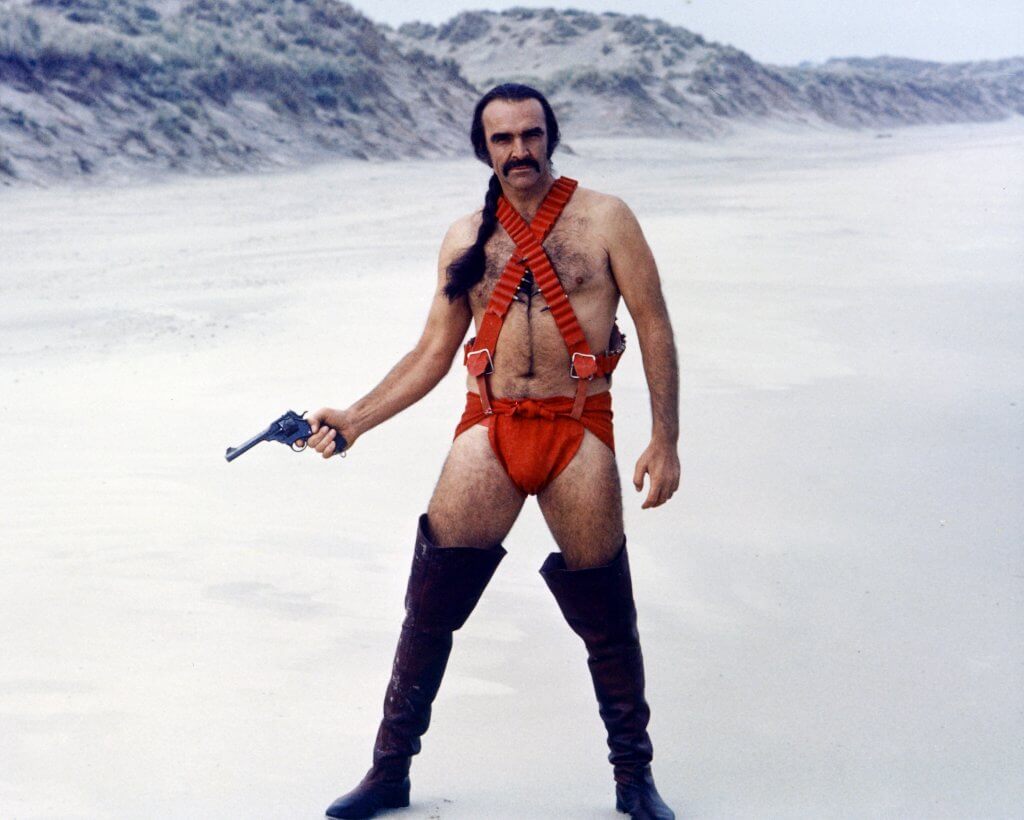
Two of us knew and loved this movie, while two of us hadn’t seen it. Our conversation follows.
Jillian Luft: I like to think Zardoz is responsible for my body’s need to nap for two hours after viewing it. In fact, I know it is. The body shut down because the waking mind of this mortal was overwhelmed.
Katharine Coldiron: I think this is the third or fourth time I’ve seen it and in between, I always wonder if I’m exaggerating about how wild it is when talking about it to others. Every time I see it again, I’m like, nope, if anything I undersold it.
I really want Tex to tell the story of the little book we mailed back and forth across LA. Also, I promise I’ll tell you why I thought of this movie in a literary way, but I want to know if anyone else has ideas/vibes about that.
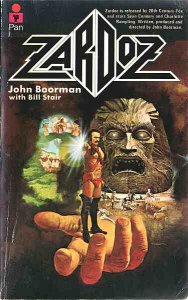 Tex Gresham: I follow an account on Twitter that posts movie novelizations (something I sort of collect and am fascinated by) and saw one for Zardoz. Looked it up and it’s written by Boorman and his friend. It doesn’t really add anything new to the movie except for some insight into Zed’s thoughts, but it is surprisingly well-written. Had there never been a Zardoz movie and only this book, I wonder if it (the book) would be considered a sci-fi “great.” Anyway, Katharine wanted to read it so I mailed it to her, so we’ve both read this little thing that’s kinda useless in the face of the movie.
Tex Gresham: I follow an account on Twitter that posts movie novelizations (something I sort of collect and am fascinated by) and saw one for Zardoz. Looked it up and it’s written by Boorman and his friend. It doesn’t really add anything new to the movie except for some insight into Zed’s thoughts, but it is surprisingly well-written. Had there never been a Zardoz movie and only this book, I wonder if it (the book) would be considered a sci-fi “great.” Anyway, Katharine wanted to read it so I mailed it to her, so we’ve both read this little thing that’s kinda useless in the face of the movie.
I think my favorite part of the movie is when they experience Zed’s penis going from flaccid to aroused after they turn off the visual stimulus and he’s left staring at Consuella. It’s the most boorish (pun?!) meet cute moment for their eventual “relationship.”
Rebecca Gransden: I knew near nothing about this film bar its reputation, and the iconic images associated with it—the outfit, the floating rock head—going in. Wrongly, I’ve always assumed it to be a misfire, the type that ends up being less than the sum of its parts. Nope. It’s a lot to process on a first watch. I switched between a state of disbelieving wonder and being numbed into submission while watching it. As I like to go into films blind, I have no idea how knowing or self aware this film is. Is it satirical? And if so, what the hell is it satirizing? Seemed to me to be affectionately pulling the pigtails of on the nose social commentary in science fiction, but in all honesty I’m mostly bewildered.
Great opening scene as well. I knew I was going to love it when the head started to vomit guns. The tone felt like a Monty Python film. Is that a common comparison? Feels like it would be.
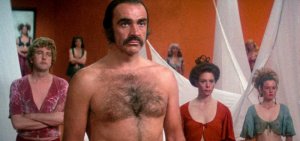 JL: Tex’s favorite part of the movie was the one scene I was familiar with prior to viewing. At my local movie theater, they create clever montages of film clips related to the movie you’re seeing. I’m not sure what movie I was seeing but it must have been balls-to-the-wall wild because that scene is so spectacularly singular. I remember seeing it and remarking, “I have to find out what the hell this is immediately!” but then I forgot to research. Connery’s facial expression alone. So cocky (pun reluctantly intended) and impish. And yes, let’s talk about that relationship between Zed (Connery) and Consuella (Rampling). Is it like a love/hate? A 70s sci-fi Sam and Diane dynamic? I found it really confusing. But they’re both stunning, so I went with it. The movie kinda forces you to go with it. If you resist, it makes for a mind-straining view. It’s like Friend resisting Tier 2 meditation (another incredible scene).
JL: Tex’s favorite part of the movie was the one scene I was familiar with prior to viewing. At my local movie theater, they create clever montages of film clips related to the movie you’re seeing. I’m not sure what movie I was seeing but it must have been balls-to-the-wall wild because that scene is so spectacularly singular. I remember seeing it and remarking, “I have to find out what the hell this is immediately!” but then I forgot to research. Connery’s facial expression alone. So cocky (pun reluctantly intended) and impish. And yes, let’s talk about that relationship between Zed (Connery) and Consuella (Rampling). Is it like a love/hate? A 70s sci-fi Sam and Diane dynamic? I found it really confusing. But they’re both stunning, so I went with it. The movie kinda forces you to go with it. If you resist, it makes for a mind-straining view. It’s like Friend resisting Tier 2 meditation (another incredible scene).
And I totally thought of Python with the guns spewing. I’m not a huge Python fan (I know, I know) but from that indelible image alone, I locked into the tone of the movie and was sold. Of course, I began to question this initial understanding of one as it continued to evolve in more and more batshit ways. Is it satire? Is it earnestly trying to say something about life and immortality? More importantly, what was happening in Boorman’s life when he created this tale?
If someone asked me to provide a summary of this movie, I would fail miserably. But maybe we should try? There’s so much to unpack.
My favorite scene might be when Zed is hiding out and the Apathetics accost him, imbibe his neck sweat like an aphrodisiac—is that what’s happening?—and proceed to moan orgiastically, enlivened again by Zed’s hot optimal body salt. No matter how perplexing this movie is, I know one thing: It’s supremely horny.
I really want to respond intelligently to Katharine’s inquiry about the literary elements of this film, but I’m struggling. So many ideas blazed through my mind and, just as quickly, flamed out.
KC: What I was thinking when I picked this movie—well, in part, I always love seeing what people make of Zardoz, especially smart people. But I’ve always wondered whether it would make more sense as a novel than a movie. The world it builds is so particular, with so many proper nouns and long-developed cultural ways different from our own. That’s a great setup for a scifi novel, or a series of them, and instead this movie tries to cram all that world-building into under two hours. (Which by itself is wild—can you imagine this movie being under two hours in today’s Hollywood??)
This sense of the movie being rich in detail and oddity was why I was excited about the novel version that Tex lent me, because I hoped it would expand on the stuff I found baffling. But it doesn’t at all! It’s just as opaque and evocative as the movie. I’d still like to see an actual novel, with lots of detail, but also—over time, I’ve come to treasure this movie’s total uniqueness, and to not want it to be replicated or expanded upon. With a lot of competition, no other 1970s movie is this ambitiously odd, while still adhering to some of the period’s dumb, New Agey ideas and its hideous fashions.
I also thought of it for this roundtable because of its connection to one of the most famous children’s novels of all time. I’m curious what you all make of that. The movie version of The Wizard of Oz has been important (crucial, really) to folks like David Lynch and Guy Maddin, but I’m not sure the book is literarily important here. Wouldn’t mind being wrong about that.
RE: the relationship with Zed and Consuella, I’m not surprised it unfolded the way it did, even if I’m disappointed. Boorman’s reputation is just the kind that would have a female character mistaking lust for repulsion and it turns out she hate-loved him all along. Blech. I don’t think that’s an Eternals thing, I think it’s just sexism. I do wish May and Consuella had been one character, that all the setup of Zed and May working together led to them being life partners instead.
One of my favorite things about giallo is how obviously and totally sex and death intertwine, but for Boorman it seems like violence and desire intertwine. I don’t think of that as a given, but the movie seems to take it that way. Thoughts?
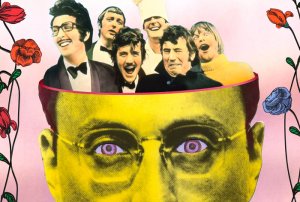 TG: Monty Python! That’s it! Zardoz feels like some collaboration between Monty Python and Stanley Kubrick. And I think that connects to the idea of violence and desire. Kubrick lives in a world where violence is horny. And not just physical, but emotional and psychological as well. It’s satirical in the same way this movie is—YOU CAN’T REALLY TELL WHERE THE SATIRE LIVES. But Boorman is definitely operating in a zone that has the penis as a gun, and baby, if the gun can shoot, people are gonna get hurt. Cuz for me, the lens of this movie is inherently sexist, but almost apologetically so. Have you seen the man who was canceled for [insert Zed’s behavior]? Well he’s trying to learn and grow now and guess what? He’s better than us now. A legend, really. That idea that it takes a man, even a brute, to help a woman realize what she never could alone.
TG: Monty Python! That’s it! Zardoz feels like some collaboration between Monty Python and Stanley Kubrick. And I think that connects to the idea of violence and desire. Kubrick lives in a world where violence is horny. And not just physical, but emotional and psychological as well. It’s satirical in the same way this movie is—YOU CAN’T REALLY TELL WHERE THE SATIRE LIVES. But Boorman is definitely operating in a zone that has the penis as a gun, and baby, if the gun can shoot, people are gonna get hurt. Cuz for me, the lens of this movie is inherently sexist, but almost apologetically so. Have you seen the man who was canceled for [insert Zed’s behavior]? Well he’s trying to learn and grow now and guess what? He’s better than us now. A legend, really. That idea that it takes a man, even a brute, to help a woman realize what she never could alone.
I would have to watch it again with Wizard of Oz in mind, but it feels like Boorman might’ve thought of Oz and said We’re gonna blow that tired old shit out of the sky. And gave Dorothy a gun. It plays more like a ouroboros of the Oz story. The god is a hoax twice in Zardoz. Oz isn’t a fairytale land under oppression but rather a nightmarish world made from suppression.
When I watch movies, I have to connect with one of the characters. I go “OK, I’m with you now” and it could be a minor or major character. And in this, I couldn’t connect to anyone except maybe the Apathetics. Maybe that’s where I’m at right now. Maybe the 17-year-old me would go Zed is life. Zed is the way. (If 17-year-old me would’ve understood the movie at all). Was it just me or did this feel like one of the only movies where there wasn’t a single character you could connect with?
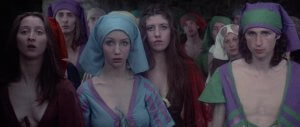 RG: It hits a sweet middle spot between the New Age psychedelic woo woo peaking at the time and evergreen profundities doesn’t it? On one level, it seems everything is a mockery. The progression of the Zed and Consuella relationship plays out so awkwardly that it’s comic. It is drawn at such an infantile level, and shifts so abruptly, that it’s laughable. I found myself thinking “more sexism!” as this aspect is made so ridiculous that sexism itself becomes absurd. I jest a little, but I can’t take it seriously, whatever was rattling around in Boorman’s noggin at the time. Someone wise who I’ve forgotten said that satire only works if the target is admired, if there is some affection for the subject, or at least understanding. I’m contradicting myself, but if Boorman had set out to make a purely cynical piece, then it wouldn’t be half so interesting. The joy is in the wildness, the seemingly what-the-hell-why-not approach that defines it.
RG: It hits a sweet middle spot between the New Age psychedelic woo woo peaking at the time and evergreen profundities doesn’t it? On one level, it seems everything is a mockery. The progression of the Zed and Consuella relationship plays out so awkwardly that it’s comic. It is drawn at such an infantile level, and shifts so abruptly, that it’s laughable. I found myself thinking “more sexism!” as this aspect is made so ridiculous that sexism itself becomes absurd. I jest a little, but I can’t take it seriously, whatever was rattling around in Boorman’s noggin at the time. Someone wise who I’ve forgotten said that satire only works if the target is admired, if there is some affection for the subject, or at least understanding. I’m contradicting myself, but if Boorman had set out to make a purely cynical piece, then it wouldn’t be half so interesting. The joy is in the wildness, the seemingly what-the-hell-why-not approach that defines it.
Regarding what is going on with social commentary, where I am largely lost overall (not that I think that matters), I do think there is one element where it does have a clear and consistent point of view, and that is highlighting the perils of utopianism, here demonstrated by the desperation of a section of society closing itself off from a suffering wider world in order to preserve, what it views as, the best of humanity. This is actually conveyed in a successful way by the film, maybe in spite of itself, I’ve no idea.
Okay, the outfit. I do feel it deserves some discussion. My initial thought has it being a product of its time. As Zed is supposed to represent primal machismo it also occurred to me that the costume designers might have been trying to find something that looked sci-fi, while at the same time showing as much of Connery’s hairiness as possible. He’s also a target throughout the film, and the criss-crossing red over his chest could denote that he is a marked man, x marks the spot, the red hot passionate one.
Like Tex, I’d have to watch it again through a The Wizard of Oz filter to have anything coherent to say, but the double lifting of the curtain is fascinating. Like Katharine my instinct is it isn’t embedded in the narrative to the extent that it would be literarily significant. There is an overabundance of ideas and to me the inclusion of this book is there to fulfill quite superficial points, that are interesting, to draw parallels, but I’m not left with any impulse to deconstruct it further via that lens, at least on a first viewing.
As for lack of characters to connect with, I connected with the head.
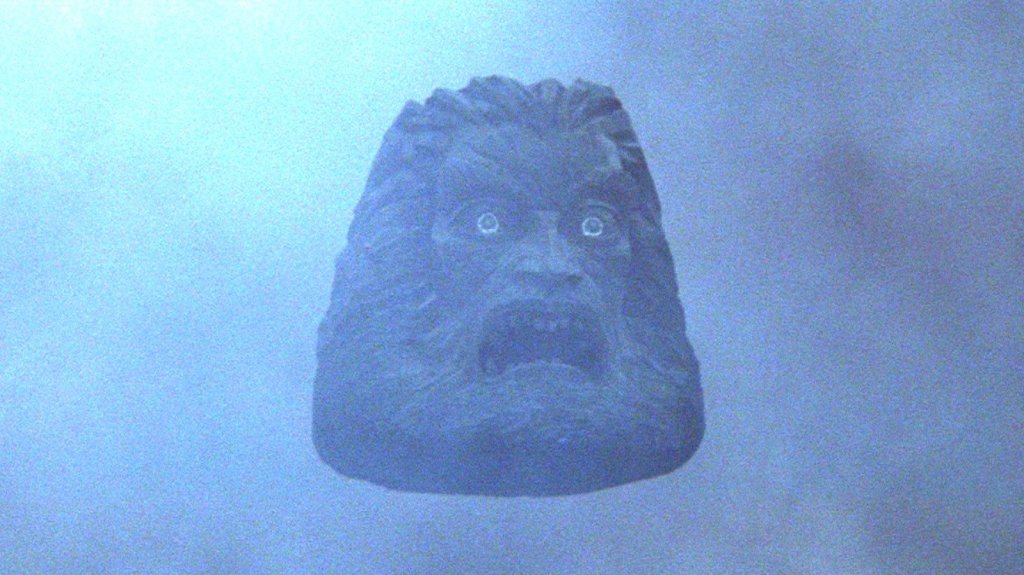
JL: I found myself connecting with the Apathetics as I would find immortality a dreadful bore and much rather be dead, especially if I had to live in the pseudo-spiritual hilarity of the Vortex and wasn’t allowed to indulge in fornication or good eats. That bread looked devastatingly unappetizing, and I realize it’s a product of the arid Outlands toiled over by mortal slaves, but still. Where were the hedonistic delights? The ambrosia salad? So grim.
But I also had a fondness for the Renegades, those rebels forced to age and live out their days in that pathetic dance hall. It resembled Cocoon if it was a horror film or, maybe, a bad Jackass sketch. There was something charming about their anarchic behavior and pleading for Zed to kill them.
Agree with Rebecca. The sexism was so overblown it was ludicrous. However, I don’t think that was intentional. A product of its time, I guess. Desire and violence definitely intertwine but there appears to be a third more obscure thread at play—knowledge. There’s that trippy scene where Zed is inseminating all the ladies and, in exchange, they tell him everything they know. At least in this scene, the movie seems to posit a watered-down representation of the Descartian mind-body problem. Maybe? Ultimately, I think the movie is about the meaningless of existence—how we can’t derive supreme meaning from anything even as immortals in utopia because the mechanisms of power and violence will emerge as they are innately within all of us. Especially when we’re bored by our own perfection. Is this gleaning giving the movie too much credit? Perhaps. But it’s the absurdity that permeates nearly each scene that leads to me believe it’s at least aware of nihilism.
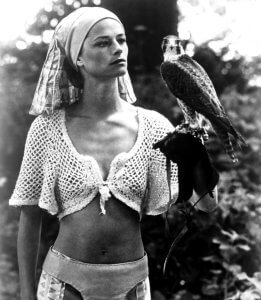 But, yes, let’s slow down here and spend time on the wardrobe–or lack thereof. Zed is wearing what can only be described as a diaper with a harness. Yet, his get-up mostly consists of that iconic and virile mass of chest hair. For a society that proclaims “The Penis is evil!” within the first few minutes of the movie, they certainly draw attention to Zed’s member with his garb. I also paid attention to Consuella’s clothing. She’s outfitted mostly in serene hues of green. Perhaps they wanted to convey that she is of nature, therefore profoundly feminine, or make the viewer think of the Emerald City of Oz. It’s a stretch, but I believe any wacky interpretation is possible and warranted.
But, yes, let’s slow down here and spend time on the wardrobe–or lack thereof. Zed is wearing what can only be described as a diaper with a harness. Yet, his get-up mostly consists of that iconic and virile mass of chest hair. For a society that proclaims “The Penis is evil!” within the first few minutes of the movie, they certainly draw attention to Zed’s member with his garb. I also paid attention to Consuella’s clothing. She’s outfitted mostly in serene hues of green. Perhaps they wanted to convey that she is of nature, therefore profoundly feminine, or make the viewer think of the Emerald City of Oz. It’s a stretch, but I believe any wacky interpretation is possible and warranted.
While I couldn’t draw immediate literary parallels, I kept thinking of Menahem Golan’s The Apple (1980) while viewing. Another zany sci-fi allegorical mess of a movie ostensibly about big themes, primarily the Biblical take on good v. evil. But it’s so overwrought and ridiculous. Any ideas it poses are instantly eclipsed by its idiosyncratic narrative, the so-awful-they’re-good musical numbers and the wardrobe department’s highly imaginative vision of what rock stars wear in the future. I love The Apple because it’s incredibly ambitious but incredibly flawed. And so, I have a soft spot for Zardoz. I would recommend it to anyone who wants to be wowed by the batshit powers of cinema.
Zardoz is not streaming for free in July 2023, but can be rented or purchased from a variety of services.

